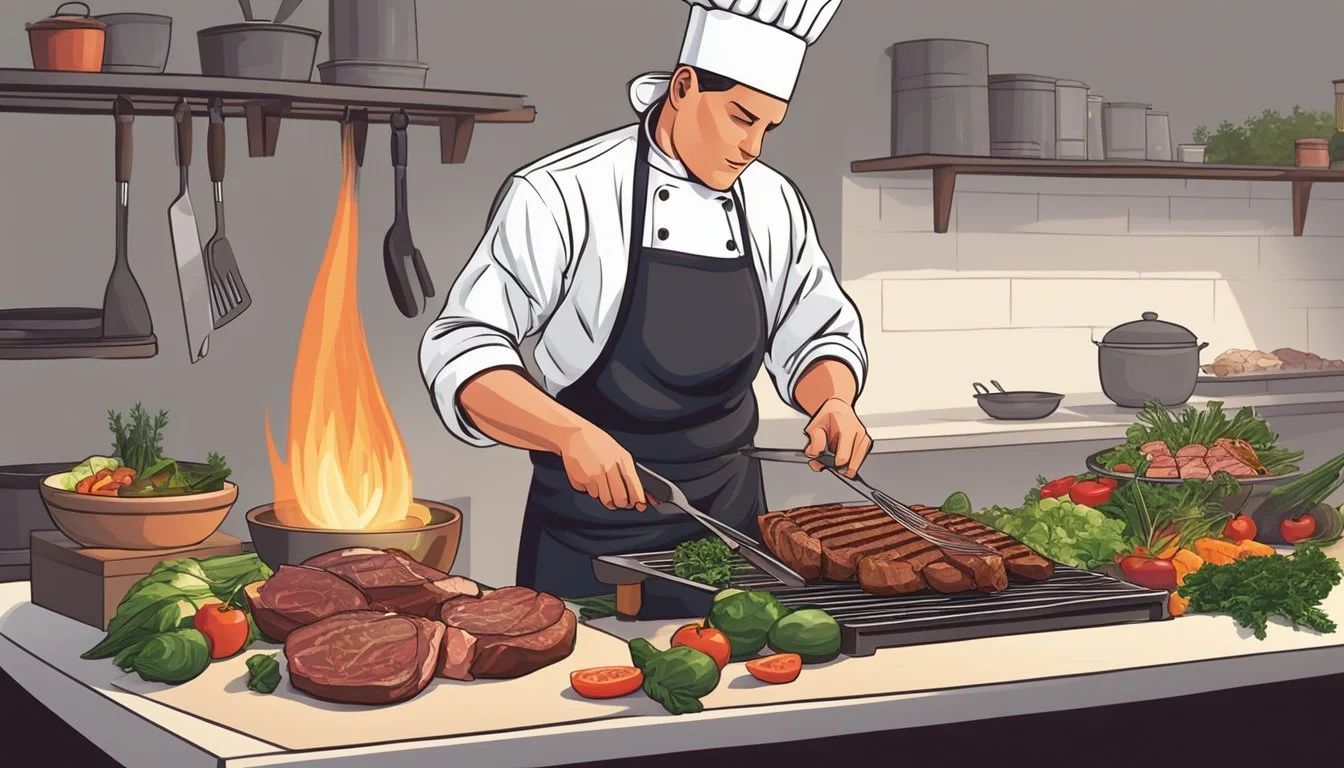The Carnivore Diet for Professional Chefs
Mastering the Art of Flavor and Well-being
The Carnivore Diet has emerged as a dietary trend that piques the interest of professional chefs seeking to push the boundaries of culinary innovation while considering health implications. With a focus on animal-based products, the diet is rooted in the belief that humans can thrive on meats alone, reflecting an extreme standpoint in the spectrum of dietary choices. It simplifies meal planning to include primarily meats, fish, eggs, and certain dairy products, eliminating the inclusion of fruits, vegetables, and grains that are typically hallmarks of a balanced diet.
While the simplicity of the Carnivore Diet presents a straightforward approach for chefs to create rich, protein-centric dishes, it raises questions about the long-term health benefits and potential risks. Proponents claim improved energy levels, weight loss, and even the alleviation of certain autoimmune conditions. Yet this high intake of saturated fat and cholesterol with an absence of fiber and plant-based nutrients has garnered criticism from health professionals, suggesting an increased risk of heart disease and nutrient deficiencies.
Navigating this complex terrain, chefs are challenged to balance taste and indulgence with nutritional science, being mindful of the diet's restrictions and the health implications for their patrons. As food experts, they wield the power to transform the Carnivore Diet's monolithic focus on meat into culinary experiences that delight the senses while engaging critically with the health considerations this diet ensues.
Understanding the Carnivore Diet
The Carnivore Diet emphasizes consuming exclusively animal products, with claims of health benefits and weight loss. It has sparked interest and controversy in nutritional science and public opinion.
Defining the Carnivore Diet
The Carnivore Diet is characterized by the consumption of primarily meat, fish, eggs, and select dairy products. It excludes all plant-based foods, positioning itself as a zero-carb, high-fat, and high-protein dietary regimen.
Historical Perspective
Historically, some cultures have thrived on meat-centric diets due to geographic and environmental constraints. Shawn Baker and Mikhaila Peterson are modern proponents popularizing this diet as a means to improve health and combat disorders like autoimmune diseases.
Comparison with Other Diets
Compared to other diets, the Carnivore Diet is more restrictive. Unlike keto which allows for limited carbs, or paleo which includes fruits and vegetables, the carnivore approach eliminates all plant-derived foods. This contrasts with the balanced diet recommended by many nutritionists that includes a variety of food groups.
Scientific Basis of Meat Consumption
Science recognizes that animal products are rich in essential nutrients like protein, vitamins, and certain fatty acids. Meat consumption is seen as beneficial for muscle maintenance, brain function, and satiety levels.
Potential Health Implications
There are potential health risks including increased cholesterol, high blood pressure, heart disease, and kidney problems associated with high intakes of saturated fats and red meats. However, some individuals report improved markers of inflammation and blood sugar control.
Ethical and Environmental Considerations
The diet raises concerns about animal welfare and environmental sustainability. The high demand for animal products can contribute to increased greenhouse gas emissions and pose questions about ethical farming practices.
Common Misconceptions
Common misconceptions are that the Carnivore Diet is universally healthy or entirely without benefit. The truth lies in individual responses to the diet's high fat and protein content, with varying impacts on health, weight loss, and overall well-being.
Carnivore Diet Variations
Variations of the diet exist, ranging from strict adherence to only meat, salt, and water, to more lenient versions that include dairy-free options or small amounts of low-carb, animal-based foods like certain types of cheeses and heavy creams.
Preparation and Cooking Techniques
Professional chefs aiming to offer a carnivore diet menu must ensure that the emphasis is on taste and health. The preparation and cooking techniques are fundamental to achieving the delicate balance between these two aspects.
Selecting Quality Ingredients
When curating a carnivore diet-focused menu, the selection of high-quality meat and eggs is paramount. Chefs should source grass-fed beef, free-range poultry, wild-caught fish, and organ meats from reputable suppliers. The freshness, type, and cut of the meat contribute significantly to the flavor and nutritional value.
Butchery and Meat Processing
Proper butchery and meat processing is essential. It involves understanding how to break down carcasses to obtain the premium cuts and how to handle and store them to maintain their quality. Aging of meats, especially beef and lamb, can develop complexity in flavor and tenderness.
Cooking Methods for Optimal Taste
The carnivore diet benefits from a range of cooking methods:
Grilling and roasting provide a charred, smoky flavor, perfect for steaks and lamb chops (What wine goes well with lamb chops?).
Sous-vide ensures even cooking and can make tougher cuts succulent.
For bacon and pork, smoking can infuse depth in the dish.
Flavor Enhancements without Carbs
To intensify taste without carbohydrates, chefs must be creative with spices and herbs. For instance, a rub of rosemary and garlic elevates a roasted chicken's flavor profile. Emulsified sauces made with animal fats like butter and cream can add richness to the dish without adding carbs.
Meal Planning and Presentation
Planning multiple courses for a carnivore diet requires thoughtful pairing and serving. A sequence might include a light fish appetizer, a rich main course with ribeye steak, and a diverse cheese platter. Plating aesthetics should not be overlooked, as the visual appeal can enhance the overall dining experience.
Using these techniques, chefs can craft a carnivore diet menu that satisfies the palate while adhering to its health principles.
Nutrition and Supplementation for Chefs
Professional chefs often face unique dietary challenges, balancing the rich flavors their career demands with the necessity of personal health. Nutrition and supplementation play critical roles in maintaining this balance, especially for those considering or currently following a carnivore diet.
Macronutrient Ratios and Caloric Intake
Calories and macronutrients must be tailored to individual energy demands. It's crucial for chefs to monitor their intake of protein, fat, and the amount of energy they consume daily. On a carnivore diet, the emphasis is on:
Protein: Essential for muscle repair and growth; options include ribeye, salmon, and eggs.
Fat: Serves as a primary energy source; found in high amounts in foods like bacon cooked in butter.
Fat and protein-rich diets should be constructed mindfully to sustain energy levels without overconsuming calories which can easily occur with readily available high-calorie foods in the kitchen.
Micronutrients and Vitamins
Despite the focus on protein and fat, vitamins and minerals are vital for overall health. Vitamin C and electrolytes (such as magnesium and calcium) are important for chefs, especially considering the scarcity of these nutrients on a carnivore diet. Sources can include:
Liver and kidneys: High in various vitamins and minerals.
Bone broth: A source of electrolytes.
Incorporating organ meats and nutrient-rich broths can help mitigate the lack of fruits and vegetables that would otherwise provide essential micronutrients.
Supplementing on a Carnivore Diet
Supplementing may become necessary on a carnivore diet to address potential nutrient gaps. Key supplements may include:
Vitamin C: To support immune function and tissue repair.
Electrolytes: To maintain fluid balance, particularly important given the diuretic effect of a high-protein diet.
It's recommended that chefs work with a healthcare provider to determine any personalized supplementation needs based on their dietary choices.
I highly recommend purchasing vitamin C and electrolyte supplement online for a convenient shopping experience!
Hydration and Beverage Pairing
Proper hydration is fundamental, with water being the beverage of choice. Chefs should aim for:
Consistent water intake, avoiding dehydration that may stem from hot kitchen environments.
Moderate consumption of tea or other non-alcoholic, low-calorie beverages that can complement their meals without adding excessive sugars.
It’s advisable for chefs to limit alcohol and high-sodium drinks that can contribute to dehydration and caloric excess. Beverages should support the chosen dietary framework, enhancing both the dining experience and the chef’s health.
Adapting Restaurant Menus
Professional chefs understand the importance of meeting customer demand through innovative menu design. By integrating a carnivore diet focus, chefs can cater to health-conscious diners, adhere to specific dietary restrictions, and merge nutrition with culinary art.
Catering to Carnivore Diet Customers
To accommodate those following a carnivore diet, it is essential to offer meat-based dishes that eliminate plant-based foods. Menus should list high-protein and high-fat items such as:
Beef (steaks, ribs)
Poultry (chicken, turkey breast)
Seafood (fish, crab (how long does crab last?))
Pork (chops, bacon)
Organ meats (liver, kidney pie)
Sides and seasonings should be adjusted accordingly, focusing on simple salt and pepper to enhance the natural flavors.
Marketing Strategies for Carnivore Options
Effective promotion of carnivore options can set a restaurant apart. Key strategies include:
Highlighting carnivore specials on social media
Displaying customer testimonials, focusing on health and flavor profiles
Education of staff to advocate the diet's benefits
Seasonal trends also play a role; for instance, a winter game menu may attract those seeking hearty, rich flavors.
Considerations for Dietary Restrictions
A successful carnivore menu must consider various restrictions while maintaining nutritional balance. Allergy warnings must be clear, offering dairy-free and autoimmune protocol compatible dishes. Crucial components to include are:
Comprehensive labeling of potential allergens
Dairy substitutes like ghee for lactose intolerance
Menu options that avoid common triggers, like eggs or certain seafood
Balancing Culinary Art with Dietary Constraints
Chefs can employ culinary techniques to deliver exquisite flavors within dietary limits. Balancing creativity with constraints involves:
Exploring different cooking methods (e.g., sous-vide, grilling)
Experimenting with texture and temperatures to enhance appeal
Designing dynamic presentations to visually delight patrons
Pro tip: Master the use of natural fats and juices to bring dishes to life, maximizing both health and taste.
Health and the Professional Chef
Professional chefs often face unique health challenges due to long work hours and high-stress environments. In response, the carnivore diet has emerged as a topic of interest for its potential benefits and risks to chefs' well-being and long-term health. The following subsections explore how this diet integrates with a chef's lifestyle, focusing on energy management, stress resilience, and prevention of chronic diseases.
Chef’s Health and the Carnivore Diet
Chefs considering the carnivore diet should be aware of how a meat-centric approach to eating can influence their health. While it may provide immediate energy and aid in muscle maintenance, it could also lead to elevated cholesterol levels and joint stress, particularly if large amounts of red meat are consumed. It is crucial to approach this diet with a balanced understanding of its potential impacts on the body.
Benefits:
High protein intake supports muscle repair and growth.
Simplicity of meals can lead to more efficient food preparation.
Risks:
Potential increase in the risk of heart disease from high saturated fat.
Possible deficiencies in fiber, vitamins, and minerals that plants provide.
Managing Energy and Stress
The demanding nature of the culinary profession requires steady energy levels and effective stress management. A diet high in lean meats and fish can help maintain energy and focus. However, absence of carbohydrates might cause fluctuations in energy levels, affecting a chef’s ability to cope with long hours.
Strategies for energy and stress management:
Incorporate a variety of lean proteins for sustained energy.
Ensure adequate sleep to help mitigate the demands of the job.
Practice moderation if following a carnivore diet to avoid burnout.
Culinary Career and Long-Term Health
A long-term commitment to the culinary arts can lead to sustained physical strain, particularly as one consults orthopedic surgeons for joint health issues common in chefs. Adhering to a restrictive diet such as the carnivore diet can potentially contribute to the development of chronic diseases over time, making it imperative to balance taste and well-being.
Considerations for a sustained culinary career:
Regular physical activity to complement dietary choices and support joint health.
Cycling different diets to ensure a wide range of nutrients are consumed.
Consultation with health professionals is advised for personalized dietary guidance.
Challenges and Controversies
In the realm of nutrition, the carnivore diet has sparked intense debate due to its restrictive nature and the potential health implications. Professional chefs need to be aware of the common side effects, the ongoing health debates, and the regulatory landscape when balancing taste with health considerations.
Addressing Common Side Effects
The carnivore diet can lead to an adaptation period where individuals may experience constipation, electrolyte imbalances, or a shift in blood pressure, owing to the absence of carbohydrates and high intake of saturated fat. Chefs must consider these factors when creating menus that are appealing yet mindful of potential health risks.
Constipation: A lack of dietary fiber often contributes to digestive discomfort.
Electrolyte Imbalance: The diet's low carb nature can cause fluctuations in electrolyte levels.
Blood Pressure Changes: Sudden dietary changes may affect blood pressure.
Debating Health Controversies
Health experts continue to debate the long-term effects of a carnivore diet, especially concerning its high saturated fat content and the exclusion of plant-based nutrients. While some studies associate saturated fat with heart disease, proponents of the diet argue that eliminating carbohydrates provides substantial health benefits.
Saturated Fat vs. Heart Disease: Chefs face the challenge of providing heart-healthy options while adhering to the carnivore diet's principles.
Carbohydrate Exclusion: Carbohydrates are traditionally seen as an essential energy source; their absence from the diet is controversial.
Legal and Health Regulations
Legislation and health codes play a pivotal role in the food industry, focusing on safety and nutrition. Chefs must navigate these regulations while also addressing the unique needs of those following the carnivore diet.
Legislation: Compliance with laws that ensure food is safe and meets nutritional standards is mandatory.
Health Codes: Safety practices must be in place to prevent foodborne illness, even with a limited ingredient list.
By staying informed on these challenges and controversies, professional chefs can skillfully marry the culinary art with the principles of the carnivore diet, ensuring they cater to health-conscious patrons while adhering to food safety and regulation standards.
Dialogue with Healthcare Professionals
The carnivore diet, a regimen consisting almost exclusively of animal products, has become a topic of significant debate within healthcare circles. Professional chefs are encouraged to understand the scientific and health implications of this diet by engaging in discussions with healthcare professionals. This dialogue can help to balance taste with potential health benefits and risks, ensuring informed menu creation.
Consulting with Dietitians and Doctors
When chefs consider incorporating the carnivore diet into their menus, it is crucial to consult with dietitians and doctors. Healthcare providers bring a wealth of nutrition science to the table, elucidating the diet's potential health benefits—such as weight loss and improved blood sugar control—and its risks, such as nutrient deficiencies and its impact on chronic diseases.
Health Benefits: Potential for reversal or improvement of diabetes, obesity.
Health Risks: Possible nutrient deficiencies due to exclusion of plant-based foods.
Chefs are advised to ask informed questions about the long-term sustainment of the carnivore diet and how it aligns with overall patient care principles.
Presenting Evidence and Personal Experience
A two-way conversation between chefs and healthcare professionals involves presenting anecdotal evidence and clinical studies. Chefs might share observations from clients who have tried the carnivore diet, while medical professionals can refer to health data and research findings.
Anecdotal Evidence: Reports of individuals experiencing significant health transformation.
Clinical Studies: Scientific research providing insights into the diet's long-term effects.
This exchange of information helps both parties to form a trust-based relationship, fostering clear communication on the topic of dietary health.
Collaborative Approach to Diet Counseling
The ultimate goal for chefs and healthcare providers is to collaborate on diet counseling to ensure the health and satisfaction of diners. By sharing insights from nutritional science and culinary practice, both parties work together to advise on a balanced approach to diet that may offer benefits while mitigating risks.
Collaboration Elements:
Trust: Establishing a mutual trust based on expert knowledge and experience.
Communication: Maintaining clear, open lines of dialogue regarding dietary choices.
Patient Care: Prioritizing the health and well-being of individuals considering the carnivore diet.
This collaborative methodology emphasizes the importance of evidence-based practice in the culinary field, particularly when controversial diets like the carnivore diet are concerned.
Conclusion
The carnivore diet emphasizes a high intake of animal products and excludes plant-based foods. This regimen promises certain health benefits, such as improved mental clarity and weight management. However, professionals within the culinary field should approach this diet with caution, balancing the rich flavors that often accompany animal-based dishes with the overarching goal of health.
Health Outlook: While some individuals may experience improvements in specific health conditions, incorporating a variety of nutrients is crucial for long-term well-being.
Balanced Diet: A diverse diet that includes a range of foods may provide a more balanced nutritional profile than one limited exclusively to animal products.
Future Research: The impact of the carnivore diet on health over time requires further investigation. Ongoing studies are essential to fully understand its long-term effects.
Chefs aiming to cater to patrons following the carnivore diet should focus on:
Quality: Source high-quality, organic, and sustainably-raised meat products.
Variety: Offer a range of meats, including organ meats, for broader nutritional content.
Preparation: Use cooking methods that enhance flavor without compromising health, such as grilling or sous-vide.
The culinary world must continue to observe and adapt to dietary trends, ensuring that taste and health remain central to the dining experience.










